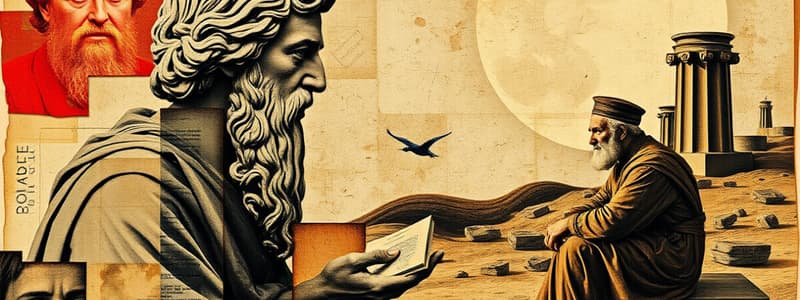Podcast
Questions and Answers
What did Socrates believe was essential for understanding the essence of existence?
What did Socrates believe was essential for understanding the essence of existence?
- Accepting societal norms
- Acquiring material wealth
- Conquering others
- Examining our life (correct)
According to Plato's dualism, what are the two distinct elements that he identified?
According to Plato's dualism, what are the two distinct elements that he identified?
- Mind and body (correct)
- Life and death
- Soul and material wealth
- Reason and appetite
What aspect of the self did René Descartes focus on in his philosophy?
What aspect of the self did René Descartes focus on in his philosophy?
- The need for social interaction
- The involuntary nature of thinking (correct)
- The ability to feel emotions
- Physical existence in the world
What does Cartesian skepticism imply about human perception?
What does Cartesian skepticism imply about human perception?
In St. Augustine's view, what must one do to truly understand oneself?
In St. Augustine's view, what must one do to truly understand oneself?
What are the two parts that make up self, according to the provided content?
What are the two parts that make up self, according to the provided content?
What method does Socrates believe can restore knowledge that is forgotten upon entering the material world?
What method does Socrates believe can restore knowledge that is forgotten upon entering the material world?
How does the content describe the nature of the soul in contrast to the physical body?
How does the content describe the nature of the soul in contrast to the physical body?
What does the Greek word 'Philos' signify in the context of philosophy?
What does the Greek word 'Philos' signify in the context of philosophy?
What is emphasized about the nature of philosophy according to the content?
What is emphasized about the nature of philosophy according to the content?
Flashcards are hidden until you start studying
Study Notes
Philosophical Perspectives on the Self
- Socrates emphasized the importance of self-examination, stating "The unexamined life is not worth living."
- Plato, a student of Socrates, argued for the immortality of the soul, distinguishing between the immaterial mind and the material body.
- Plato's tripartite theory of the soul:
- Reason: The rational aspect
- Spirit: Emotions and desires
- Appetite: Basic biological needs
Contributions of Major Philosophers
- Rene Descartes:
- Known for "Cogito ergo sum" (I think; therefore I am).
- Asserts that thinking is involuntary and defines selfhood through consciousness.
- St. Augustine:
- Emphasized knowledge of self through a relationship with God.
- Believed man is created in God's image and strives for divine connection.
Philosophical Methodologies
- Socratic Method: A dialectical approach involving questioning to stimulate critical thinking.
- John Locke's memory theory posits that personal identity is tied to memories and experiences, categorizing self-awareness as a consciousness that evolves over time.
Modern Philosophical Views
- David Hume:
- Denied a permanent self, asserting that identity is a collection of impressions from experiences.
- Promoted direct sense experience as the source of knowledge.
- Immanuel Kant:
- Proposed that the self is constructed from actions and decisions, and that individuals are defined by their moral actions.
- Sigmund Freud:
- Introduced the distinction between conscious and unconscious selves, with the unconscious driving behavior and emotions.
- Highlighted the significant role of the unconscious mind in shaping identity.
Contemporary Views on the Self
- Paul Churchland:
- Advocated for physicalism, positing that the self is synonymous with the brain, dismissing any immaterial aspects of existence.
- Emphasized that understanding the self is rooted in neuroscience and physiological states.
- Maurice Merleau-Ponty:
- Focused on embodied subjectivity, where self-concept arises from the interplay of mental, physical, and emotional dimensions.
- Gilbert Ryle:
- Defined the self through observable behavior, contending that self-identity emerges from actions and social interactions.
Key Themes in Understanding the Self
-
Self-Presentation vs. Self-Realization:
- Self-presentation involves external expressions, while self-realization concerns internal truths and aligning with one's divine purpose.
-
The concept of the self as a fluid, evolving entity shaped by experiences rather than a fixed identity.
-
Recognition that values are not inherent but are shaped by individual perceptions and interactions with the world.
-
The necessity of integrating both conscious awareness and unconscious influences in forming a holistic understanding of the self.
Studying That Suits You
Use AI to generate personalized quizzes and flashcards to suit your learning preferences.




